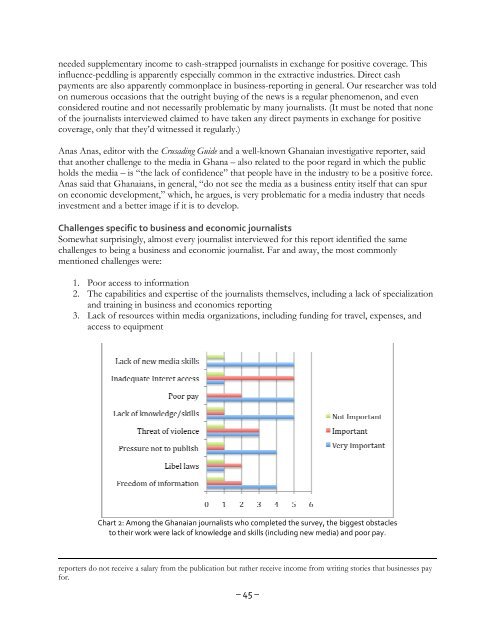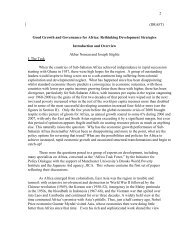in transparency, are simply not being written. Like most other Ghanaian print reporting, coverage ofthe extractive industries is limited⎯almost entirely⎯to hard news stories: announcements,statements, allegations, and events. Hard news stories are important, but the extractive industriesrequire much more comprehensive reporting. Based on this very limited analysis of Ghanaian printcoverage of the extractives, it would appear that the Ghanaian media could be doing a much betterjob at covering an industry that is increasingly vital to Ghana’s economic development.Challenges to Journalism in GhanaCross-cutting challengesThe African Media Development <strong>Initiative</strong> (AMDI), a project launched by the BBC World ServiceTrust in 2006 to increase support <strong>for</strong> the development of African media, estimated in 2006 thatthere were 2,000 working journalists in Ghana, a third of whom were graduates of the GhanaInstitute of Journalism’s post-secondary school training program. Journalism in Ghana is a difficult,often temporary profession <strong>for</strong> people in their 20s and 30s that offers few enticements. Ourresearcher found that while many of the journalists interviewed were passionate about journalism,the realities of the profession⎯low pay, unreliable work, few opportunities <strong>for</strong> advancement, andthe poorly regarded professional status of journalism⎯meant that many journalists inevitably leavetheir beats <strong>for</strong> higher salaries in the private sector, especially public relations, and <strong>for</strong> diplomaticwork. That they gain contacts <strong>for</strong> their new jobs while working as journalists is certain, and probablyone of the few real perks of the profession.Journalism in Ghana suffers from being poorly regarded as a profession. Journalism’s status, in turn,affects the quality of reporting and the talent it can attract and retain. Several veteran journalistsinterviewed <strong>for</strong> this report expressed their frustration over their chosen profession’s poor standingin Ghanaian society. Francis Kokutse, a 20-year veteran journalist who now writes <strong>for</strong> the WallStreet Journal and international wire services, told a story that highlights journalism’s status in thecountry: “My colleague from journalism school, who went into the army, is now a colonel. He meetsme in the street, and his younger junior officers assume that the colonel is better off than me.Because we journalists don't use ranks, to them I’m just a bloody reporter walking the streets ofAccra.”Another veteran journalist, over an interview at the Ghana Press Association’s lush open-airrestaurant, says that it’s easy to tell who has stayed in journalism and who has gotten out just by howthey get around Accra. He pointed to two women getting into a sparkling black SUV and said thatthe woman driving was the owner and left journalism some years ago <strong>for</strong> a career in public relations.She was giving a ride to the other woman, a <strong>for</strong>mer colleague who never left journalism, and whogets around town by catching rides from friends because she can’t af<strong>for</strong>d her own car.Journalists’ low, sometimes non-existent pay in Ghana also means that the profession is highlysusceptible to interference from business interests. 133 As a result, businesses regularly offer much-133 From asking a few journalists, it seemed that the better paid journalists (working <strong>for</strong> Ghanaian newspapers) were paidaround $350/month, while journalists at the smaller private papers probably average around $85/month, though many– 44 –
needed supplementary income to cash-strapped journalists in exchange <strong>for</strong> positive coverage. Thisinfluence-peddling is apparently especially common in the extractive industries. Direct cashpayments are also apparently commonplace in business-reporting in general. Our researcher was toldon numerous occasions that the outright buying of the news is a regular phenomenon, and evenconsidered routine and not necessarily problematic by many journalists. (It must be noted that noneof the journalists interviewed claimed to have taken any direct payments in exchange <strong>for</strong> positivecoverage, only that they’d witnessed it regularly.)Anas Anas, editor with the Crusading Guide and a well-known Ghanaian investigative reporter, saidthat another challenge to the media in Ghana – also related to the poor regard in which the publicholds the media – is “the lack of confidence” that people have in the industry to be a positive <strong>for</strong>ce.Anas said that Ghanaians, in general, “do not see the media as a business entity itself that can spuron economic development,” which, he argues, is very problematic <strong>for</strong> a media industry that needsinvestment and a better image if it is to develop.Challenges specific to business and economic journalistsSomewhat surprisingly, almost every journalist interviewed <strong>for</strong> this report identified the samechallenges to being a business and economic journalist. Far and away, the most commonlymentioned challenges were:1. Poor access to in<strong>for</strong>mation2. The capabilities and expertise of the journalists themselves, including a lack of specializationand training in business and economics reporting3. Lack of resources within media organizations, including funding <strong>for</strong> travel, expenses, andaccess to equipmentChart 2: Among the Ghanaian journalists who completed the survey, the biggest obstaclesto their work were lack of knowledge and skills (including new media) and poor pay.reporters do not receive a salary from the publication but rather receive income from writing stories that businesses pay<strong>for</strong>.– 45 –
- Page 1 and 2: THEREWILLBE INKA study of journalis
- Page 3 and 4: AcknowledgementsThis paper has bene
- Page 7 and 8: Executive SummaryPurpose of the Rep
- Page 9 and 10: journalists in these countries that
- Page 11 and 12: Existing International Training Opp
- Page 13 and 14: • Consumer Affairs and Informatio
- Page 15 and 16: Background 3Of the three countries
- Page 17 and 18: pervasive conflict in the Niger Del
- Page 19 and 20: 3) Crises or disruptions, where som
- Page 21 and 22: Low pay and low regardOne of the mo
- Page 23 and 24: Even in cases where working journal
- Page 25 and 26: But while some reporters think FOIB
- Page 27 and 28: When asked how much the media could
- Page 29 and 30: the effects of these challenges for
- Page 31 and 32: detailed analysis of the opportunit
- Page 33 and 34: journalist said he has, however,
- Page 35 and 36: completely make use of some of the
- Page 37 and 38: money. Their knowledge of what medi
- Page 39 and 40: Notes on conducting research in Nig
- Page 41 and 42: Ghana- 35 -
- Page 43 and 44: evenues each year,” 106 which wou
- Page 45 and 46: entertainment news, scandals, and p
- Page 47 and 48: The rise of business-focused journa
- Page 49: coverage of the oil industry is als
- Page 53 and 54: as supporting one political party o
- Page 55 and 56: Numerous journalists recounted how
- Page 57 and 58: Training programs available to busi
- Page 59 and 60: Amos Safo, editor-in-chief at the p
- Page 61 and 62: Notes on conducting research in Gha
- Page 63 and 64: Background 136Literacy and Educatio
- Page 65 and 66: “sufficient information” about
- Page 67 and 68: or criminal charges for content the
- Page 69 and 70: have such difficulty obtaining info
- Page 71 and 72: The majority of those interviewed b
- Page 73 and 74: commitment to their profession and
- Page 75 and 76: Notes on Conducting Research in Uga
- Page 77 and 78: Recommendations for Revenue Watch I
- Page 79 and 80: people who have no journalism backg
- Page 81 and 82: analyzes business,” he said, “e
- Page 83 and 84: A journalist with The Punch said,
- Page 85 and 86: The Media Foundation for West Afric
- Page 87 and 88: Length of TrainingRoughly three-qua
- Page 89 and 90: industries, for instance, ought to
- Page 91 and 92: otherwise being published in the pr
- Page 93 and 94: Non-Training Recommendations for Ug
- Page 95 and 96: Appendix A: NigeriaPotential Partne
- Page 97 and 98: journalists. Biakolo is very profes
- Page 99 and 100: Television Stations• Nigerian Tel
- Page 101 and 102:
have two to four month professional
- Page 103 and 104:
City: AccraTelephone: +233 (021) 22
- Page 105 and 106:
Fax: +256 414 255 495E-mail: umdf@a
- Page 107 and 108:
• What do you think are the most
- Page 109 and 110:
Appendix E: Survey Questions1. Name
- Page 111 and 112:
18. How effective were the teaching
- Page 113 and 114:
28. What are the most important cha
- Page 115 and 116:
1. Journalists by Country2. How wou
- Page 117 and 118:
5. How often do you travel out of t
- Page 119 and 120:
9. Which organization(s) sponsored
- Page 121:
12. After completing the training(s














